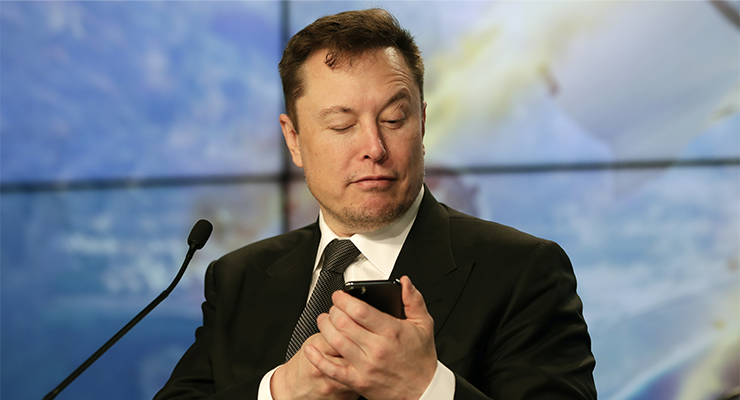
It was another wild time on markets overnight as the Australian dollar tumbled down towards US$0.68c and US technology stocks sold off again amid fears about rising inflation and interest rates. The US stock market is now headed for its sixth straight weekly loss. It’s a similar scenario for the Australian dollar, which was back up at US$0.75c as recently as last month.
The tech sell-down was focused on Apple last night, but it has only slumped 22% from its 12-month high. Compare that with Netflix, which is down 75%, and Amazon (44%) and Disney (45%).
Disney released its quarterly results overnight and while subscriber numbers to Disney+ have continued to rise, it missed both earnings and profits forecasts, sending the shares to a two-year low of US$104.37. This is hurting the Murdoch family’s wealth as they still have a majority of their falling fortune tied up in Disney shares.
While Elon Musk has agreed to pay US$46 billion in cash to buy Twitter, shares in the technology company closed 2% lower at US$45.08 last night, a 16.8% discount to Musk’s US$54.20 offer price. This suggests there is rising risk that the takeover won’t complete.
Twitter is an unusual tech stock because it does not hide behind a dodgy dual-class voting structure that entrenches the power of founders (hello News Corp, Fox Corp, Meta and Alphabet).
However, the company did first attempt to rebuff Musk’s bid by implementing this dubious poison pill, which would have massively diluted the stake of any shareholder who bought more than 15% of the company. How US companies can be allowed to legalise such blatant theft in the home of capitalism and democracy remains a mystery.
Thankfully, once Musk lined up US$25.5 billion in debt funding, demonstrating the seriousness of his bid, the Twitter board folded and accepted the biggest cash offer ever made by an oligarch anywhere. The key to this outcome was support from Twitter founder Jack Dorsey, who is currently occupied digesting the over-priced acquisition of Afterpay by his Square/Block payments outfit last year.
Musk recently dumped another US$8.5 billion worth of Tesla stock to help fund the Twitter purchase, but has still pledged his residual stake to create the world’s largest margin loan.
How else would he fund the biggest cash takeover in the history of media and entertainment, a sector which always attracts celebrities and billionaire oligarchs like no other? That said, it is also wrong for commentators to keep saying that Musk has bought Twitter. He has agreed to buy Twitter, and it will take six months to settle.
For now, Musk is simply a 9% shareholder without board representation, so he is no position to do things like reinstate Donald Trump’s Twitter account.
The deal could yet be blocked by regulators, voted down by shareholders or cancelled by either party, although that would trigger break fees, which provide significant disincentives. If the Tesla share price continues to fall, along with the broader market, Musk could also find that his financing falls over.
In terms of who is providing Musk’s debt finance, it is gaggle of global investment banks comprising two American, two Japanese, two French and one UK financier.
As for who actually signed the Musk loan documents in New York, we get far greater transparency than any Australian takeover would deliver. So, let’s name them:
Andrew Earls: Morgan Stanley
Scott Tolchin: Bank of America
Jeremy Hazan: Barclays (UK)
Tim Dilworth: MUFG (Japan)
Ray Ventura: Mizuko (Japan)
David Berger: BNP (French)
Richard Knowlton: Societe Generale (French)
If US takeovers are anything like what happens in Australia, various hedge funds will no doubt be hoovering up discounted Twitter shares on the assumption that Musk is big and mad enough to go through with this deal.
That’s still likely, but don’t be surprised if Musk sells off another $10 billion-plus worth of Tesla shares in the coming weeks to reduce his debt load and de-risk the broader Musk Inc empire.
However, Tesla shares are also being caught up in the tech rout. There are roughly 1 billion Tesla shares on issue and Musk owned about 170 million or 17% before launching his raid on Twitter. When Tesla shares peaked at US$1145 on April 4, Musk was clearly the richest man in the world with a stake worth more than $US190 billion.
However, Tesla shares finished at just US$728 last night, the lowest close since August last year and a 36.4% drop in just six weeks from the April 4 peak.
As for Tesla’s ongoing performance, the detail in this 29-page quarterly report is nothing short of staggering. Reporting a US$3 billion quarterly profit on revenue of $US18.7 billion is quite extraordinary, and Musk reiterated his claim that production could be lifted from 936,000 in 2021 to 1.5 million this year.








is ‘quite extraordinary’ code for ‘I don’t believe the financial reporting’?
On a sodden & dull day in Brisbane the news that Amazon stock is down 44% provided some cheer.
Musk lost me when he said he’d reinstate Trump on Twitter. Power looking after power.
What Musk is after is free speech, if that means reinstating Trump and others so be it. What he also wants is to make the guiding algorithms open source. That’s huge! Not Facebook or YouTube or most other platforms will allow such a thing.
With no documents signed, perhaps Musk is driving the price down so he can buy it at 40-60% discount to what he offered?
‘How US companies can be allowed to legalise such blatant theft in the home of capitalism and democracy remains a mystery’. Of course you are being ironic on all counts aren’t you Stephen?